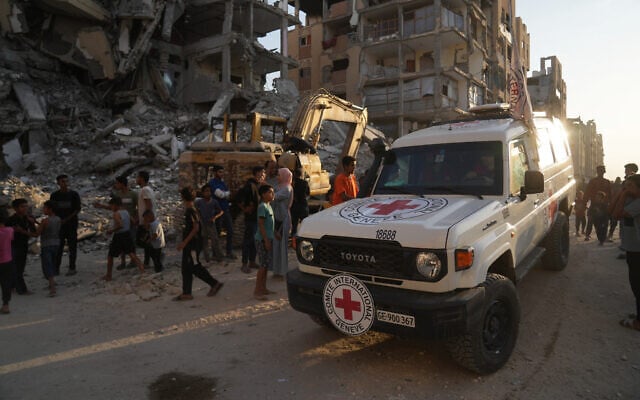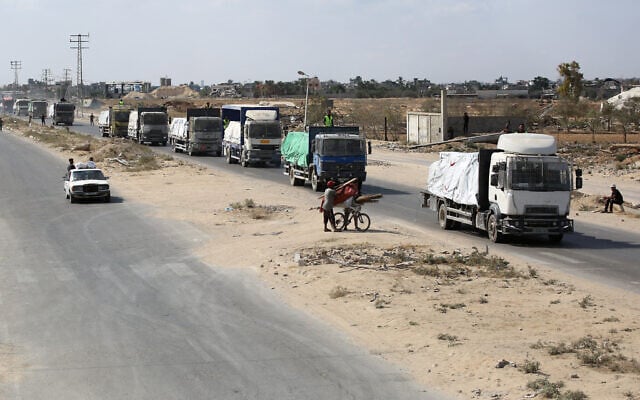Israel said Saturday evening that Gaza’s Rafah Crossing with Egypt would remain closed until Hamas “fulfills” its part in the Gaza ceasefire-hostage deal, rejecting a statement by the Palestinian Embassy in Egypt that the crossing would reopen on Monday.
The back and forth came almost a week after the US-brokered deal between Israel and Hamas came into effect.
The reopening of the crossing, which has been largely closed since Israeli forces entered Rafah in May 2024, would allow Palestinians residing in Egypt to return to Gaza, the embassy said in a statement.
The office of Prime Minister Benjamin Netanyahu quickly denied that the crossing would reopen on Monday, stating that it would remain closed due to what it said was Hamas’s failure to live up to the terms of the ceasefire deal.
“Its reopening will be considered based on the extent to which Hamas fulfills its part in returning the fallen hostages, and in implementing the agreed-upon framework,” the Prime Minister’s Office said.
The deal that entered into effect on October 10 required Hamas to release the remaining 20 living hostages and return all bodies of the 28 deceased hostages accessible to it within the first 72 hours after the IDF’s withdrawal to the so-called Yellow Line inside Gaza.
But almost a week into the ceasefire, Hamas had only returned 10 bodies, insisting that it is finding it difficult to locate others due to the level of destruction across the Gaza Strip. (On Saturday night, the terror group announced it was returning two more bodies.)
Israel has accused Hamas of lying, with senior officials insisting Hamas could return a greater number than it has so far provided.

The Hostages and Missing Families Forum praised Netanyahu’s move to keep the crossing closed until Hamas meets the terms of the deal, saying Saturday evening that the government “must take a firm stance against Hamas and demand the return of all 18 [deceased] hostages without exception, and use all leverage at its disposal.
“The government must declare that it will not proceed with implementing the agreement until all the fallen hostages are returned, in accordance with the Trump framework,” the Forum added.
The Rafah Crossing, when it does eventually reopen, will do so only for the movement of Palestinians in both directions, not for the entry of aid, which has been entering Gaza from Israel since the start of the ceasefire.
Since the US-brokered halt to two years of devastating war, around 560 metric tons of food have entered the Gaza Strip per day on average — still well below the scale of need, according to the UN World Food Programme.
The Rafah Crossing was shut by Egypt after Israeli forces seized the Gaza side in May 2024, but was briefly reopened in early 2025 during a short-lived ceasefire.
After two years of bombardment and blockade, the need for food, medicine, shelter, and other aid in Gaza is extreme.
In March, Israel launched an 11-week blockade of all aid into Gaza, causing food stockpiles to dwindle and prices to shoot up.
Following outcry over the reports of widespread starvation in the war-torn enclave, Israel announced in late July that it was expanding measures to let more aid in. But Gaza’s side of the Rafah crossing remained closed, meaning shipments were routed through the Israeli crossing of Kerem Shalom, about 3 kilometers (2 miles) to the south.

Aid workers and truck drivers complained that they faced a host of obstacles at Kerem Shalom, ranging from rejections for minor packing and paperwork issues to limited operating hours at the Israeli crossing, meaning they could only bring in a fraction of the aid that was needed.
Israel denied that it was limiting aid into the enclave, saying instead that the UN was failing to deliver it in a timely manner and accusing Hamas of looting and stealing.
In August, a global hunger monitor declared famine was unfolding in Gaza City in the enclave’s north. Israel dismissed the findings as false and biased.
Gaza’s health authorities say that more than 400 people have died from malnutrition-related causes. Israel says the figures are exaggerated and many deaths were attributable to other causes.

